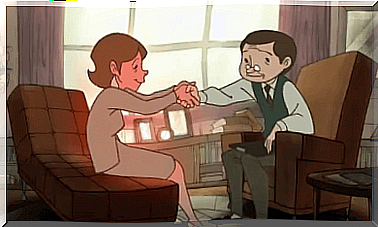How To Respond To Criticism And How To Profit From It

When we receive a review, we usually experience it as a personal attack, a hurtful and in some cases shameful comment that hurts and bothers us. Therefore, responding to criticism is often not that easy, and one of our first reactions is to get defensive.
It is not a good idea to let a review affect us so much, especially if it is unwarranted. Rather than getting defensive, we would do much better to respond to criticism with assertiveness. We can therefore take advantage of it and prevent it from making us suffer.
It is important in the first place to ask ourselves a series of questions about the criticisms that we receive. Indeed, not everyone intends to harm us. For example, what is the goal of the person criticizing us? Why is she doing it? What are his reasons?
If, upon receiving a review, we don’t stop to think about why this person is so angry or why they reacted that way, we are likely to become defensive. If , on the other hand, we do not let ourselves get carried away by our impulses and calm down, everything will be much simpler. Situations seem different when we look at them calmly. Maybe the other is not that wrong …
If we nevertheless decide that the person criticizing us is wrong but we are not expressing it, and ultimately accept what they are saying, we would allow them to manipulate us. In addition, our self-esteem will be affected because we do not respect ourselves.

Face criticism
When a person does not know how to accept criticism, they usually react by apologizing (“yes, but…”), criticizing or even trying to avoid them at all costs. Some people accept them superficially but are not convinced of the need for change.
All of these behaviors are harmful because they conceive of criticism as attacks. Therefore, we will probably feel bad and we will not be able to learn them.
How to accept criticism?
We will learn to control our negative emotions s i we learn to react calmly to the criticism. By being calm, we can better take into account what others tell us and benefit from it. Only then can we assess the other’s intentions and distinguish whether they are good or bad.
So, if the criticism is constructive, we can learn from it and use it to improve ourselves. If it’s good but the other person hasn’t been able to express it properly, we can show them the right way to say things to avoid ruining the relationship.
In the event that this is an attempted manipulation, the best response is not nervousness or calm and quiet. On the other hand, by not reacting with anger, we will not show our weak points.
If the other person is right and we were wrong, it is best to rectify our position. Otherwise, the ideal is for us to reaffirm our position. If the other person continues, it is best not to respond to the provocation.
When we are calm in the face of criticism, we can find a way out of the situation, which in most cases becomes unpleasant. Responding confidently helps us not feel assaulted and helps protect our self-esteem.

How to respond to criticism successfully
Receiving a review is not pleasant. Especially when we think what they are telling us is not true. We will see below how to respond to the review successfully and how to get the most out of it.
The first step after being criticized is to analyze and change our private discourse. In other words, what we say and think in silence. For example, we can say to ourselves the following: “I have nothing to prove because no one is attacking me. Listen carefully. What he tells you can be useful. Try to figure out what this person wants. That he criticizes me does not mean that I have failed ”.
The next step we should take is to assess the review. This will help us decide whether to change our behavior or whether to reject what we have been told constructively. For this, we can question ourselves and reflect on the following points:
- Ask yourself who is doing the criticism. Is she qualified? Does she know me well enough? Does she know what she’s talking about?
- What is the other person’s goal in doing the review? Its purpose may be to make us feel bad. But it can also be about coming to an agreement or knowing what is bothering her and wanting to change it.
- Ask yourself if this is a criticism that we often receive. Is this the first time we’ve heard it or do other people agree on it?
- How much energy do we have to spend to achieve the change suggested by the critic? Is it worth it …
- Estimate the emotional climate. It means that maybe the person was maybe angry. That maybe we shouldn’t take it into account. The emotional moment gives a different nuance to the situation. We can all say things we don’t feel when we are angry. Sometimes the best thing is to put things into perspective.

What if the review is adequate?
If the answer to the question of whether the criticism is appropriate is yes, then there are a number of ways we can act. Here is what we should do:
- Control emotions. The ideal is not to get angry but to deal with what we are feeling.
- Do not defend yourself against criticism. If what is opposed to us is true, then we have nothing to defend. If we do, we waste time and energy.
- Listen actively. An appropriate response is to actively listen. In other words, to pay attention to the message in order to better understand what it is saying and to respond to the criticism appropriately.
- Request more information and seek data that will help change. It’s about finding alternatives, not getting angry.
- Request specific information on how to change. One of the key questions would be: “How can I do better?” Both to the other person and to ourselves.
- Summarize what we have been told to make sure we understand it. Summarize and ask our interlocutor if we have understood correctly.
- Establish a strategy for change. Plan and perform behaviors that help us change.
As we can see, there are two ways to respond to criticism. If the criticism is not adequate, then we have to put ourselves in the other’s shoes and try to understand why they are criticizing us. If the criticism is justified, then the best thing is to accept it and improve what is criticized.
Bibliographical references
Goleman, D. The practice of emotional intelligence. Kairos editorial. 1999










